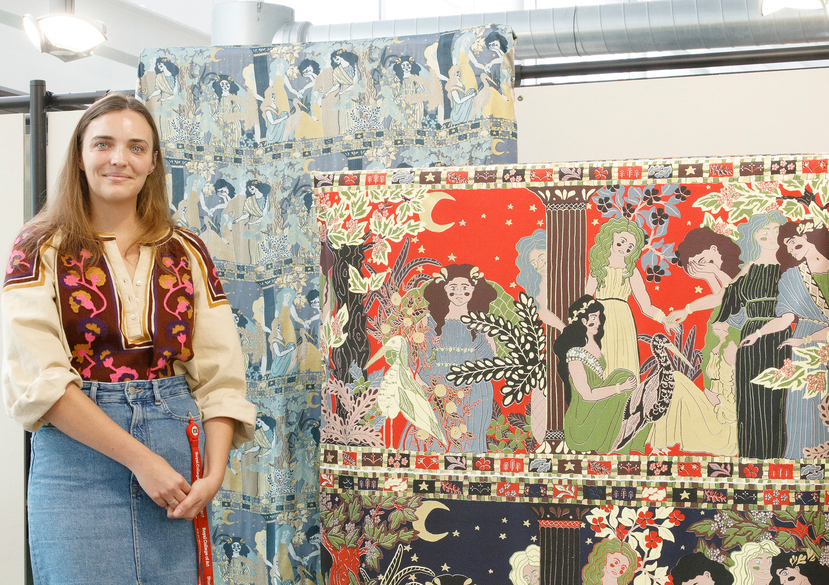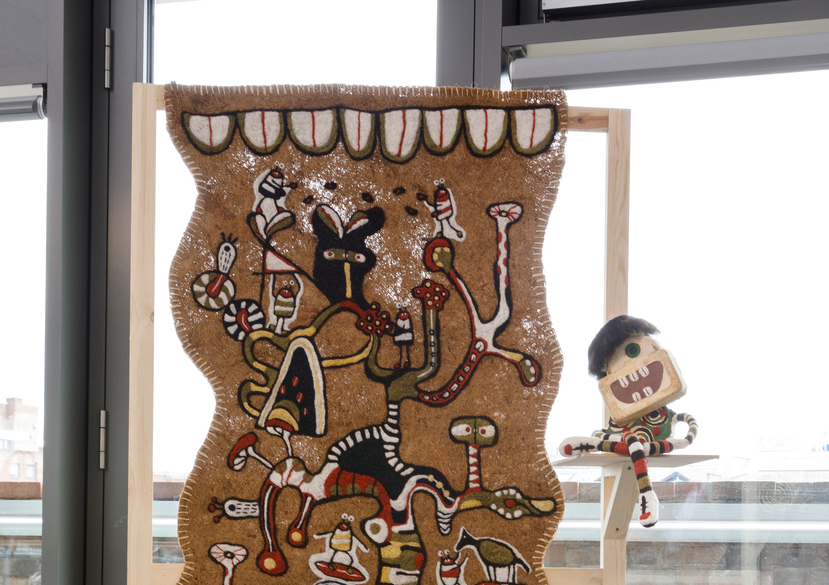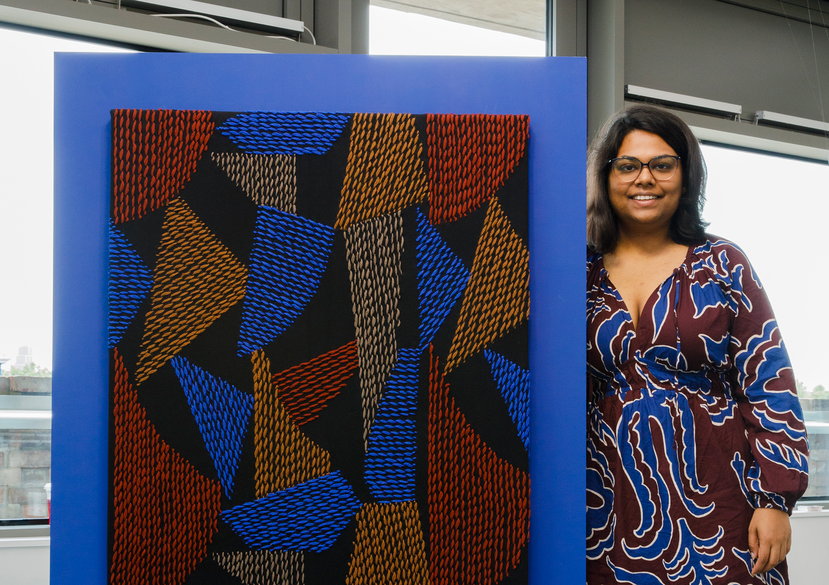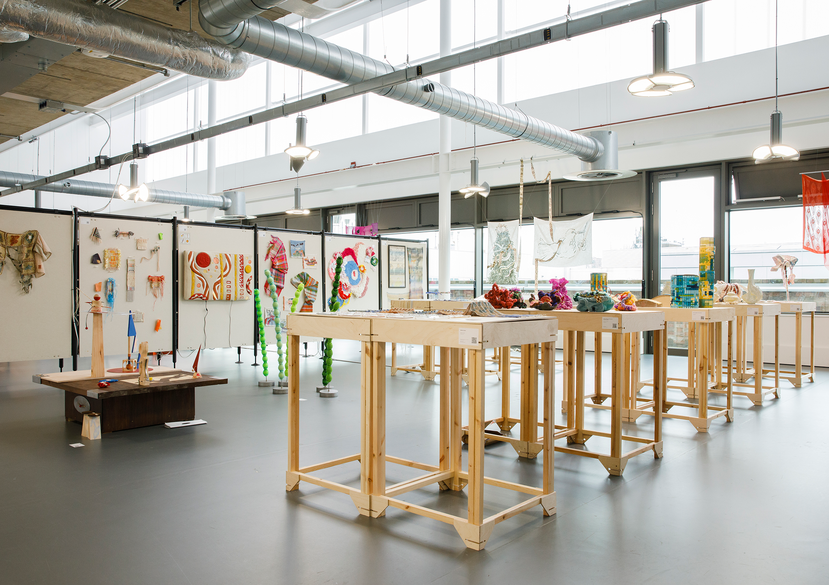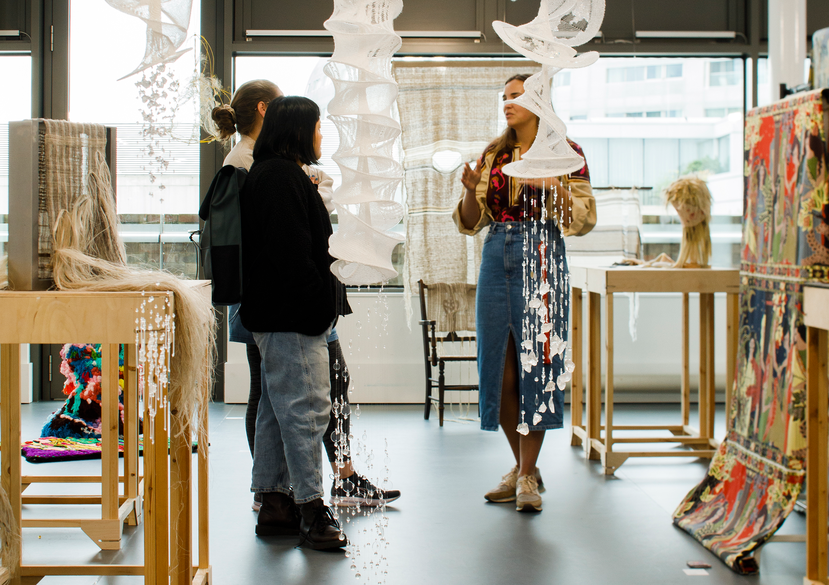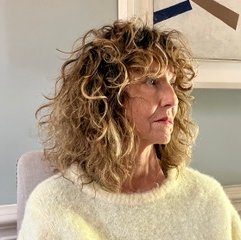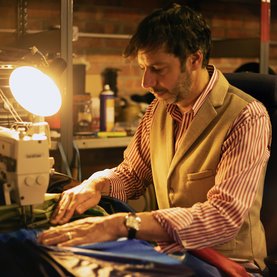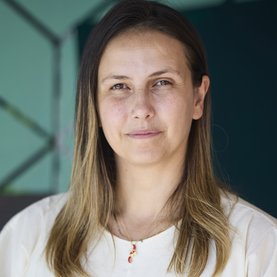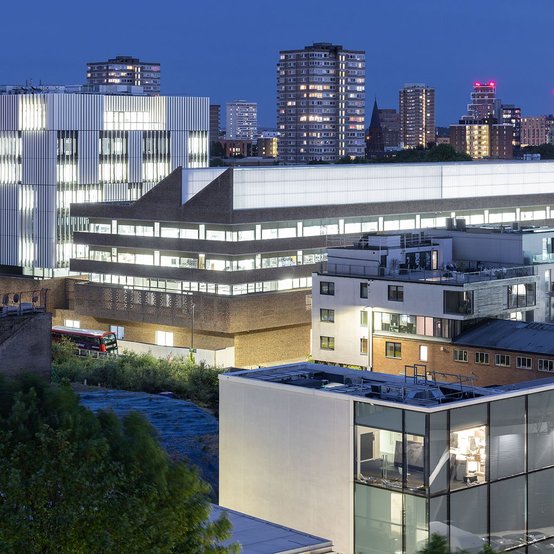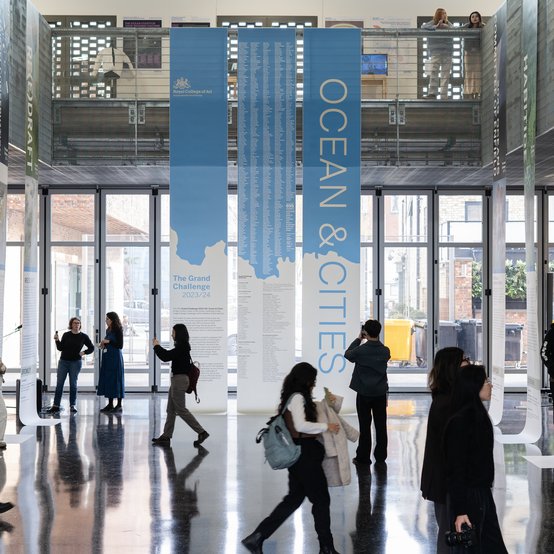
Overview
Thinking through making
Key details
- 180 credits
- 1 year / 45 week programme
- Full-time study
School or Centre
Current location
- Kensington
Next open event
- 6 May 2025
- Join next Online Q&A Week
Round 2 application deadline
- 30 Jun 2025
Working at the creative interface between materials, making and meaning.

Join a Master’s programme operating at the intersection of design, craft and fine art.
At the RCA, we actively challenge the role of the modern Textiles practitioner. Practice-led research is fundamental to our approach. We embrace a ‘thinking through making’ approach, exploring materials and processes to uncover new insights in the physical and digital domains.
The programme unites diverse practitioners, from commercial designers and individual craft and gallery-based practitioners to smart textile innovators. Be part of this vibrant community, whose broad membership is fertile ground for critical debates and questioning.
You’ll develop an individual creative identity through personally driven initiatives, collaborative work, and industry-orientated interdisciplinary projects. With a focus on radical experimentation and material exploration, we encourage an exploratory, non-linear approach that embraces the conceptual. You’ll critically engage with all aspects of the discipline to demonstrate your creative capability. We value all approaches and promote responsibility and ethical values.
Catch the replays from our latest online Open Day.
Gallery
Staff
Facilities
The School of Design is based at our historic Kensington site.
View all facilitiesWorkshops for textiles include a large-scale printmaking workshop, a dedicated dye lab, mixed media and sewing workshop and extensive knit and weave facilities that include computerised handlooms, an industrial jacquard power loom with APSO software and a dobby power loom. High-tech printing and knitting is also accessible with a state-of-the-art Shima digital knit facility
Our alumni
Our alumni form an international network of creative individuals who have shaped and continue to shape the world. Click on each name to find out more.
Where will the RCA take you?More details on what you'll study.
Find out what you'll cover in this programme.
What you'll cover
How will I learn?
Teaching types included in your programme can consist of briefings, projects, tutorials, seminars, lectures, critical forums, technical inductions, technical workshops, offsite visits and blended learning.
- Textiles Alchemy: This unit involves the following teaching typologies: Briefing, orientation, technical inductions, technical workshops, negotiated technical learning, lectures, individual and group tutorials, group critique, independent study and summative assessment.
- Textiles Make: These units involve the following teaching typologies: Briefing, lectures, technical workshops, negotiated technical learning, group workshops, critique, individual and group tutorials, independent study and summative assessment.
- Independent Research Project: This unit involves the following teaching typologies: Briefing, workshops, seminars, negotiated technical learning, individual and group tutorials, exhibition, independent study and summative assessment (Textiles Festival).
Programme structure
Term 1
Textile Alchemy (45 credits): This unit will enable you to develop a strong foundation for establishing your practice through research, experimentation and exploration of colour, material and process. You are asked to identify and evaluate the most appropriate skills and techniques for your project and to critically engage with your choice and use of materials and processes. You will be expected to engage with and contribute to the studio culture of the Programme.
Term 2
Textile Make (30 credits): This unit enables you to develop a deeper understanding and skill capability within your chosen area of practice and asks you to critically connect your making with your chosen area of practice. It is delivered through lectures, workshops, technical inductions, technical workshops, technical negotiated learning and independent study. You will develop appropriate technical knowledge, specialist skills and techniques to develop work that tests the boundaries of your practice. You will concentrate your study in a selection of these areas and develop your making skills alongside your critical development.
The content will cover current debates in the Textiles field regarding materials and topics could include Sustainability and Responsibility, Gender and Politics, Materials and Craft, Communication through Material Constructs, Textiles as Fine Art, Future Materials and manufacturing, Mixed Realities, Materials as Soft Systems, for example. Your study will be supported with individual tutorials.
In Term 2 all School of Design students will participate in the Grand Challenge, School-wide unit. The aim of this unit is to connect and challenge all students in the School through the introduction of a ‘wicked’ design problem that requires a cross disciplinary approach to problem solving which may involve external international partners. This unit and lecture series has been hugely successful in connecting and disrupting disciplines, people, philosophies and approaches to design thinking whilst providing our student body with very unique networking opportunities.
Terms 1 & 2
Across Terms 1 and 2, you will participate in AcrossRCA.
Term 3
Independent Research Project (60 credits): This is the final Masters unit and asks students to identify, develop and present a cohesive body of work that encapsulates and demonstrates their Masters level expertise. Students are responsible for setting their own scope of work, and managing their time and resources effectively. Students must be able to demonstrate a sustained trajectory of progression through the unit that encompasses creativity, critical analysis, consolidation and resolution of their ideas. Students’ development will be supported by individual and group tutorials, seminars, workshops and technical negotiated learning.
All students will take part in a collective Textiles Festival that includes public dissemination and enables the students to critique their work in relation to others and the wider discipline of Textiles.
This MA is delivered over 45 weeks.
AcrossRCA
AcrossRCA is a compulsory 30-credit unit which is delivered as part of all MA programmes.
Situated at the core of your RCA experience, this ambitious interdisciplinary College-wide unit supports you in responding to the challenges of complex, uncertain and changing physical and digital worlds. Developed in response to student feedback, AcrossRCA creates an exciting opportunity for you to collaborate meaningfully across programmes.
Challenging you to use your imagination and intellect to respond to urgent contemporary themes, this ambitious unit will provide you with the opportunity to:
- make connections across disciplines
- think critically about your creative practice
- develop creative networks within and beyond the College
- generate innovative responses to complex problems
- reflect on how to propose ideas for positive change in local and/or global contexts
AcrossRCA launches with a series of presentations and panel discussions from acclaimed speakers who will introduce the themes and act as inspirational starting points for your collaborative team response.
Delivered online and in-person across two terms, the unit has been designed to complement your disciplinary studies and to provide you with a platform to thrive beyond graduation.
Requirements
What you need to know before you apply
Candidates are selected entirely on merit and applications are welcomed from all over the world. The selection process considers creativity, imagination and innovation as demonstrated in your portfolio, as well as your potential to benefit from the programme and to achieve high MA standards overall.
You should have either a BA, a BSc or BEng, or equivalent experience, and a personal statement for the intended direction of study. We also want passion, commitment and a strong sense of personal responsibility for your own learning and development.
What's needed from you
Portfolio requirements
We suggest you use the five slots to show five different aspects of your work and capability, such as showing five different projects.
Please combine multiple files into one PDF document for each of the five project spaces. The PDF file must be viewable within standard computer screen dimensions 1600 x 1200 pixels.
Remember to consider how your uploaded work will appear to the viewer. Please make it clear what we are looking at by labelling the work accurately. We expect to see a range of things from inspiration and your design process to finished work.
Try and demonstrate your approach to textiles in your application by:
- Showing us where your inspiration comes from and how you interpret and develop this into original and creative ideas.
- Your ability and flair to use colour.
- An understanding of materials and how to manipulate and transform them. This might be showing us textile samples or pieces that you have created.
- If you do not have textile samples, show us inventive ways of transforming other materials. Examples of finished work to your best possible standard.
Personal statement
Please provide a 300-word written personal statement that addresses the following points:
- Introduce yourself, your interests and your motivations for applying to the Royal College of Art, and to this programme in particular.
- Briefly summarise any educational background and professional experience to date that will support your application.
- Tell us what you want to do in the future.
Video requirements
We ask that you upload a two-minute video recorded on your phone or laptop, speaking to us directly. High production qualities are not needed. We will review the work in your portfolio, so keep your video simple.
We’re interested to find out about you, your thinking, background and ambitions. Use this opportunity to demonstrate your knowledge and understanding of the field of textiles, including how and why you would contribute to this through your studies and future career. Use this opportunity to demonstrate some innovative and critical thinking.
The video can be considered as your responses to the types of questions you would be asked in a face-to-face interview, such as a selection from the following:
- Tell us about your choice of one project from your portfolio and why it best represents your future interests.
- Give us an example of an inspirational person, design or innovation within the field of Textiles.
- What are your aspirations for what you hope to do in the future, and how the Textiles programme will influence this?
- Describe your ideal project and how you would go about this, to include a concept and rationale for the approach you suggest and how this project challenges the discipline of Textiles.
- Talk about your analysis and creative thinking about an existing object – for example something you have in front of you.
English-language requirements
If you are not a national of a majority English-speaking country you will need the equivalent of an IELTS Academic or UKVI score of 6.5 with a 6.0 in the Test of Written English (TWE) and at least 5.5 in other skills. Students achieving a grade of at least 6.0, with a grade of 5.5 in the Test of Written English, may be eligible to take the College’s English for Academic Purposes course to enable them to reach the required standard.
You are exempt from this requirement if you have received a 2.1 degree or above from a university in a majority English-speaking nation within the last five years.
If you need a Student Visa to study at the RCA, you will also need to meet the Home Office’s minimum requirements for entry clearance.
Fees & funding
For this programme
Fees for new students
Fees for September 2025 entry on this programme are outlined below. From 2021 onward, EU students are classified as Overseas for tuition fee purposes.
Home
Overseas and EU
Deposit
New entrants to the College will be required to pay a non-refundable deposit in order to secure their place. This will be offset against the tuition fees.
Home
Overseas and EU
Progression discount
For alumni and students who have completed an RCA Graduate Diploma and progress onto an RCA MA programme, a progression discount of £1,000 is available.
* Total cost is based on the assumption that the programme is completed in the timeframe stated in the programme details. Additional study time may incur additional charges.
Scholarships
Scholarships
The RCA scholarship programme is growing, with hundreds of financial awards planned for the 2025/6 academic year.
You must hold an offer to study on an RCA programme in order to make a scholarship application in Spring 2025. A selection of RCA merit scholarships will also be awarded with programme offers.
We strongly recommend that you apply for your programme as early as possible to stand the best chance of receiving a scholarship. You do not apply directly for individual awards; instead, you will be invited to apply once you have received an offer.
More information
Additional fees
In addition to your programme fees, please be aware that you may incur other additional costs associated with your study during your time at RCA. Additional costs can include purchases and services (without limitation): costs related to the purchase of books, paints, textiles, wood, metal, plastics and/or other materials in connection with your programme, services related to the use of printing and photocopying, lasercutting, 3D printing and CNC. Costs related to attending compulsory field trips, joining student and sport societies, and your Convocation (graduation) ceremony.
If you wish to find out more about what type of additional costs you may incur while studying on your programme, please contact the Head of your Programme to discuss or ask at an online or in person Open Day.
We provide the RCASHOP online, and at our Kensington and Battersea Campuses – this is open to students and staff of the Royal College of Art only to provide paid for materials to support your studies.
We also provide support to our students who require financial assistance whilst studying, including a dedicated Materials Fund.
External funding
There are many funding sources, with some students securing scholarships and others saving money from working. It is impossible to list all the potential funding sources; however, the following information could be useful.
Payments
Tuition fees are due on the first day of the academic year and students are sent an invoice prior to beginning their studies. Payments can be made in advance, on registration or in two instalments.
Start your application
Change your life and be here in 2025. Applications now open.
The Royal College of Art welcomes applicants from all over the world.
Before you begin
Make sure you've read and understood the entrance requirements and key dates.
More information about eligibility and key datesCheck you have all the information you need to apply. Choose the programme you want to apply to and review programme-specific entrance and portfolio requirements on the programme page.
Read our application process guideConsider attending an Open Day, or one of our portfolio or application advice sessions.
See upcoming sessionsPlease note, all applications must be submitted by 12 noon on the given deadline.
Ask a question
Get in touch if you’d like to find out more or have any questions.

